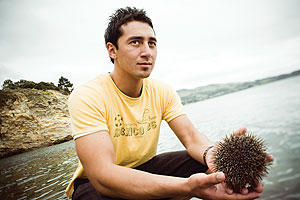

Alaric McCarthy
Marine Science
The University of Otago secured a research grant to pay his costs, because the implications of this research could be enormous.
Alaric McCarthy's postgraduate research is set to be something of a hot and cold experience - it will take him from Dunedin to the Cook Islands and Antarctica.
Currently studying for a Master of Science degree in Marine Science, Alaric spends one half of his time at the Portobello Marine Laboratory, exposing sea urchin larvae to varying levels of UV light, then looking for DNA mutations or mortality; he says it's fun.
The other half, he's doing the same thing but "in the field". Or should we say, the ocean - the tropical waters of the Pacific, the cold of the Antarctic or the temperate waters of Dunedin.
The University of Otago secured a research grant to pay his costs, because the implications of this research could be enormous.
As Alaric explains, "prior to global warming and the ozone hole, larvae in Antarctic waters were protected from UV not only by ozone but also by sea ice." Now, he's predicting that the Antarctic species will be more susceptible to increased UV than sea urchin of tropical waters (with intact ozone). And since these larvae are near the bottom of the foodweb, "there could be serious ramifications for all the other species directly or indirectly above them - including us".
Grateful to the Marine Science Department for inspiring his continued study, Alaric says he feels passionate about marine life and how it influences island people especially. Born in Kiribati, Micronesia, and very much involved in Micro- and Polynesian culture at Otago, Alaric must have been made for the task.